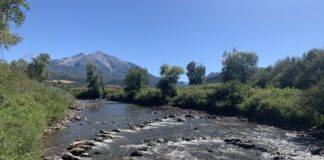
Gov. Jared Polis has appointed a Kremmling rancher to replace former state Sen. Gail Schwartz on the state’s top water board.
Paul Bruchez will now represent the main stem of the Colorado River on the Colorado Water Conservation Board. Bruchez, 40, currently serves as the agriculture representative and vice chair of the Colorado Basin Roundtable.
Along with his family, Bruchez runs Reeder Creek Ranch, a 6,000-acre cattle and hay operation, about five miles east of Kremmling, which is irrigated with water from the headwaters of the Colorado River. Bruchez is also a fly-fishing guide and has been active since about 2012 in state-level water management discussions. He is a governor appointee to the Inter-Basin Compact Committee and is on the board of the Colorado Water Trust.
“For the last 23 years, everything Colorado River and water has touched and impacted my life substantially, as well as my entire family,” he said. “We all live and breathe Colorado River issues.”
Bruchez is also spearheading a project with other neighboring irrigators to see what happens when water is temporarily removed from high-elevation hay meadows. The results of the state grant-funded study could have implications for demand management, a program state officials are exploring, designed to save water by paying irrigators to temporarily fallow fields.
The nine voting members of the CWCB are representatives from each of the state’s river basins, plus Denver. The Colorado main stem section extends from the headwaters in Grand County, through Glenwood Springs and the Grand Valley to where the river exits the state. The CWCB is tasked with developing and protecting Colorado’s water.
Bruchez said he thinks the biggest issue facing his basin is water scarcity.
“While we have challenges in the Colorado River, we also have some great people, and I hope I can make everyone proud,” he said.
Bruchez must still be confirmed by the state Senate and sworn in at the next CWCB meeting in March.

‘Too challenging’
Schwartz, a Democrat who represented a purple district in the Senate from 2007-2015, decided to step down after serving just one three-year term on the board, which began in March 2019. Schwartz said that although it was an honor to hold the seat, she felt she couldn’t be as effective as she wanted in the position.
“I am super concerned about aridification, and I feel that it was just too challenging to move the needle on these incredible challenges to the Colorado River basin because our work is so broad,” she said on Friday. “It was just too difficult to make the kind of impact I would like to make.”
At the July 2021 board meeting, Schwartz had strong words regarding the gravity of the shortages on the Colorado River and urged the CWCB to act at what she called this extraordinary moment in time.
“This is a desert, and we are going to empty every bucket, we are going to empty every river, and this is the inevitable unless we can develop the courage and the ability to step forward,” Schwartz said in July.
Some have urged the state to move more quickly on a demand management program in the face of worsening climate change, drought and water shortages. At the heart of a demand management program is paying irrigators to use less water and store that water in Lake Powell to prop up the reservoir and help the upper basin states meet Colorado River Compact obligations. If a program were implemented, Utah, Wyoming and New Mexico would also have to agree to it. CWCB board members adopted a demand management “decision-making roadmap” in September.
“(Demand management) is on the back burner, in my opinion,” Schwartz said. “There was some fabulous input, and it was a really well-run process, but there wasn’t a very clear outcome.”
Schwartz, who lives in Basalt, is also the president of Roaring Fork Habitat for Humanity and said she wants to focus her time and energy on helping to solve the valley’s housing issues.
Aspen Journalism covers water and rivers in collaboration with The Aspen Times. This story ran in the Feb. 15 edition of The Aspen Times, Vail Daily Glenwood Springs Post-Independent and Sky-Hi News.
The Water Desk’s mission is to increase the volume, depth and power of journalism connected to Western water issues. We’re an initiative of the Center for Environmental Journalism at the University of Colorado Boulder. The Water Desk launched in April 2019 with support from the Walton Family Foundation. We maintain a strict editorial firewall between our funders and our journalism.





